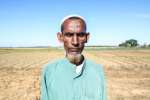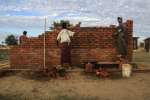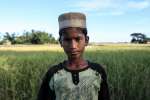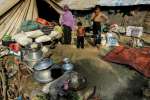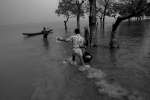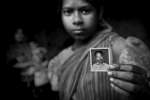In Malaysia, Rohingya arrivals hope to end cycle of abuse, exploitation by smugglers
News Stories, 5 May 2014
KUALA LUMPUR, Malaysia, May 5 (UNHCR) – The UN refugee agency is increasingly worried about the terrible conditions and acute needs of Rohingya arrivals in Malaysia after long periods of abuse and deprivation in the hands of smugglers.
Since last November, some 120 Rohingya have approached UNHCR in Kuala Lumpur suffering from varying stages of paralysis possibly caused by poor diets and long-term confinement. Their poor physical condition hints at the long and arduous journey they've taken to escape the harsh situation in Myanmar.
"We have heard accounts of ill-treatment and deprivation by smuggling networks," said Rick Towle, UNHCR's representative in Malaysia. "We've also seen growing numbers of people with acute humanitarian and protection needs, especially among vulnerable groups such as women and children."
Amina,* 45, lost her home in the 2012 inter-communal violence in Rakhine state. She and her son Rahman* lived in a camp for displaced people in Sittwe until late last year, when they boarded a boat with about 80 other people seeking a way out.
"For 18 or 20 days we had a hard time on the boat," she recalled. "There were some oats but not enough food. Three people fell sick and died. Their bodies were thrown into the sea." When they reached southern Thailand, they walked through the jungle for days until they reached the Malaysian border. "We were very weak, almost crawling by then," recalled Amina.
Others suffered in different ways. Abdullah,* a 17-year-old farm worker from the northern part of Rakhine state, paid 500,000 kyat (around US$520) for a voyage to Malaysia. The engine failed en route and he ended up in Thailand, where he was locked up for three months in a smuggler's camp in southern Thailand. Some have reported being held for up to seven months in these camps.
"There were 50 to 200 people in each tent – men, women and children. It was very cramped, bodies were touching. We sat all day and slept sitting up," said Abdullah. "If we talked too loudly they would beat us. They kept asking for money, and beat us when we couldn't give them any. They beat us one to two times a day."
Hassan,* aged 16, was held for two months. He shared a small space with 200 people in another smuggler's camp. Once a day they received a meal of rice, dried fish and cucumber and were allowed just one toilet break as the smugglers feared they would escape. "I was beaten, but I was not the worst," said Hassan, noting that some people died from the beatings. "I got scared. I was afraid I would die too."
The smugglers called his mother in Myanmar, who begged and borrowed whatever money she could to secure his release. Abdullah's family had to sell all they could to raise 1.5 million kyat in ransom. Both teenagers were released and taken across the border to Malaysia. They had to be carried as they could not walk after their ordeal.
A number of recent arrivals in Malaysia have been diagnosed with polyneuropathy (damage or disease affecting peripheral nerves) and severe malnutrition. Serious cases are hosted at a UNHCR-supported shelter where they receive care, cooked food and regular physiotherapy sessions with a visiting doctor.
"UNHCR has been working with partners to support Rohingya arrivals in need of medical attention, psychosocial counselling and other forms of assistance," said Towle. "We have a targeted protection strategy that involves special assistance for the most vulnerable, including women and children."
Three months after his release from captivity, Abdullah still feels great pain in his lower body every time he moves. Hassan can't stand up by himself but says he can walk slowly with a cane. Both are slowly recovering with support from their community and UNHCR.
Abdullah has called home using a borrowed phone. "They said they have no more money left and have to hide from the authorities, sometimes in the mountains. They try to survive by cutting wood and selling it. There's no money for the whole family to leave," he said.
He has no idea where he will go after the shelter. "I don't know why God is doing this to me. There is no peace at home and no peace here."
In Kuala Lumpur, Hassan, Amina and Rahman are living with relatives or former neighbours from their village back home. Hassan is barely on his feet, but already planning for the future: "When I recover I need to work and pay back the money my mother owes because of me. I am confident I can recover."
Since January this year, the Thai authorities have cracked down on several smugglers' camps in southern Thailand, rescuing more than 1,000 Rohingya and Bangladeshis. More are believed to be in captivity.
*Names changed for protection reasons
By Vivian Tan in Kuala Lumpur, Malaysia


















